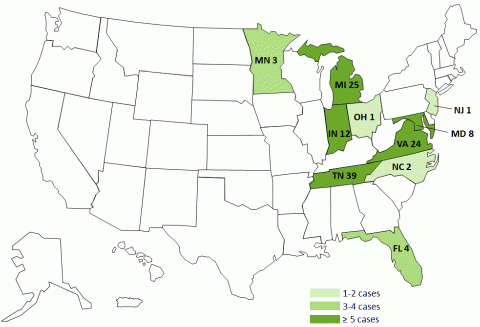 Nashville, TN – Tennessee Health Commissioner John Dreyzehner, MD, MPH, has provided an update on the investigation of infections associated with recalled methylprednisolone acetate. His statements from today’s media briefing are included below.
Nashville, TN – Tennessee Health Commissioner John Dreyzehner, MD, MPH, has provided an update on the investigation of infections associated with recalled methylprednisolone acetate. His statements from today’s media briefing are included below.
As of 1:00pm on October 9th, 2012, TDH has now confirmed 39 cases of illnesses linked to this outbreak. Of those cases, six have resulted in death of the patients.

TDH advises individuals who have received either epidural steroid injections or steroid injections into major joints involving recalled material from the New England Compounding Center to contact their health care provider if they have questions or concerns. The only persons at risk of infection in this outbreak are those who received injections of methylprednisolone acetate from NECC between June 27th and September 28th, 2012 at previously named facilities in Nashville, Crossville and Oak Ridge.
TDH has also partnered with the Tennessee Poison Control Center to establish a hotline for individuals who have questions about this outbreak. The toll-free hotline number is 1.800.222.1222.
The Centers for Disease Control and Prevention is also involved in this investigation, and is posting information online at www.cdc.gov/HAI/outbreaks/meningitis.html .
At A Glance
- Status: Ongoing Investigation
- Infection: Fungal Meningitis
- Facility Type: Outpatient Setting
- Case Count: 119
- States: 10
- Deaths: 11
Statement by Commissioner Dreyzehner October 9th, 2012
Good afternoon. Thank you for being with us and for your continuing coverage.
Since our report 24 hours ago, four additional patients have been identified in Tennessee, bringing our total to 39. We also sadly report two additional confirmed deaths, bringing our state total to six.
Every new case and every death affects real people, real loved ones and circles of friends, and we extend our sympathies to those impacted by this most tragic situation.
We have five key messages we’d like to make in today’s briefing. These are:
Our ongoing investigation indicates Exserohilum is the primary fungal infection affecting patients in Tennessee, a fungus so rare that most physicians never see it in a lifetime of practicing medicine.
We have evidence the incubation period may be longer than previously reported, possibly up to three months.
Patients who received methylprednisolone acetate should continue to be vigilant for symptoms.
Efforts to increase awareness about the need for patients to seek clinical evaluation are proving beneficial.
We’ll now address each of these points in greater detail.
First, Exserohilum rarely causes human infections. We appreciate the CDC’s work in convening national experts in fungal infections and anticipate forthcoming guidance. The currently recommended anti-fungal treatment medications are active against Exserohilum.
Second, because we are dealing with an exceptionally rare disease, the CDC is working with us and other state health departments across the U.S. with treatment recommendations. We will provide the latest information concerning recommended treatment protocols to clinicians via the Tennessee Health Alert Network.
Third, we have evidence the incubation period may be longer than previously reported. Our earliest estimate was in the range of two to 28 days. Based on the analysis of additional case studies, a more accurate range appears to be six to 42 days for our patients. Some experts believe vigilance for up to three months will be necessary.
Fourth, patients who received injections from potentially contaminated lots of methylprednisolone acetate from New England Compounding Center should pay close attention to any new symptoms of headache (either new or worsening), fever, painful or stiff neck, dizziness or falling, worsening back pain at the injection site, or other unexpected pain or numbness. It is very important for these patients and their family members to remain vigilant for signs and symptoms.
Fungal meningitis can be extremely difficult to detect early in some patients. For that reason, we strongly recommend patients and families keep alert to signs of illness. We will be issuing additional messages to clinicians through the Tennessee Health Alert Network, reinforcing the need for maintained observation and caution for at-risk patients.
Fifth, the efforts to increase awareness about the need for at-risk patients to come in for clinical evaluations are proving beneficial. We will continue to work with the CDC, the FDA, other state health departments and a variety of subject matter experts on the scientific investigation.


